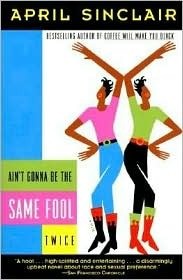What do you think?
Rate this book


324 pages, Paperback
Published February 28, 1997
“Child, maybe your nature is a journey, and not a destination.”
Sterling smiled. “You have your reputation to consider.”Based on conversations on Twitter, I know bisexual individuals are still often ostracized, so I found Stevie’s experiences searching for identity educational.
“I do?”
“Yes, you’re building a portfolio.”
“Why can’t I just be open to whatever feels right?”
“Because, then the next thing you know they’ll be calling you bisexual.”
“That’s so bad?”
“Stevie, everybody hates bisexuals. Lesbians will think you’re just a straight woman experimenting at their expense. And heterosexuals will see you as a nymphomaniac.”
“Why not Alaska? I need to stack up me some dead presidents.”I highly recommend Ain’t Gonna Be the Same Fool Twice, but you must read Coffee Will Make You Black first.
“So it’s all about the paper?” [asks Stevie]
Buster nodded. “I’ma be working on the pipeline, making some long green.”
“It’s gonna be cold up there.”
“That’s cool, ’cause money’s got all kinds of friends. Heat is one of ’em.”